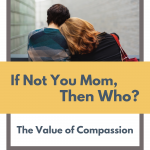If Not You Mom, Then Who?
When a child, adolescent, or young adult is struggling with an addiction or a mental health issue, parents usually feel the need to jump in and fix the problem. While addiction is a family sickness, it seems that mothers are the most impacted by their son or daughter’s substance abuse or untreated mental health. They are the ones that must endure the manipulation, violence, and erratic behaviors as they watch their child succumb to drugs or alcohol. Mothers look at the child they gave birth to, struggling with so much pain, and their hearts break. They can feel helpless and, at times, hopeless to help. Let’s look at how being compassionate can not only help you but also your child.

Parents are often told to use the tough love approach: to detach from their child with love, to let go of them, and to let them fall. For lots of parents, this goes against every instinct they have, and before they know it, they’ve become an enabling and codependent parent caught in a vicious cycle with their child of lying and manipulations. As a mom, I’ve learned that when my son gets off track, the question I need to ask is what his motivation is. Understanding what is motivating your teen or young adult to use drugs or misuse alcohol is critical in your ability to love them well. Being compassionate, in my opinion, is a better approach than being tough on them and us.
Moms (and dads), take care of yourself first.
Being compassionate to yourself does not mean that you are putting your teen’s or young adult’s needs aside, and it is not selfish.
Self-compassion is a foundation for everyone to heal. Treat yourself as you would a friend that you love, rather than criticize yourself and tell yourself you are a bad mom.
Think of ways that you can comfort yourself and remember that every season of life is temporary. Give yourself the love and compassion you need to stay strong for the war that you are waging. Share a similar story with your child about a time that you struggled, and that can help bridge the gap between you and them. Let them know that you had similar feelings when you were their age or face struggles just like they are facing. Sharing your story does not mean that you are condoning your child’s actions, it just means that you understand the pain they are going through. Take time to understand their suffering.
As a mom, I know what it feels like to want to alleviate my son’s suffering. When he hurts, I hurt. Sometimes I can help, sometimes I cannot. Sometimes you will be about to help but there may be a time when your child is out of control. Either way, take time to truly listen to them and understand how they are feeling, what thier motivation is, and what they are thinking about.
“Her children rise up and call her blessed; her husband also, and he praises her: ‘Many women have done excellently, but you surpass them all.'”
proverbs 31:28-29
Recognize their suffering and educate yourself on their issue and the best way you can help. You may want to send them to treatment or counseling immediately, and that’s ok to want. However, you should also seek counseling for yourself so that you can learn how to have clear boundaries in allowing your child to take responsibility for their actions.
Being compassionate will help everyone feel better and more positive toward healing.
Being compassionate helps reduce stress, and creates a foundation for inner peace, joy, and less negative feelings toward your child and their mental health or addiction.
Being a woman and a mom who is courageous and compassionate may seem nearly impossible when you look at what you’re facing. Society tends to not have much compassion toward those struggling with addiction, and if you don’t show others in your life what a woman of courage and compassion looks like, who will?

Our newest Intern and receptionist, Jessica is a certified alcohol and drug counselor and is now pursuing her licensed mental health counselor credentials. Please use the contact form if you would like to schedule a session with her.
Jessica is passionate about working through codependency issues, guilt and shame, and spiritual issues and allows God and Scripture to empower clients to see their potential and to find their identity in Christ. Jessica is authentic and builds rapport quickly with her clients by being personable, compassionate, and Christ-centered. She has a passion to help people develop a deeper relationship with God as they pursue wholeness in all areas of their lives.


